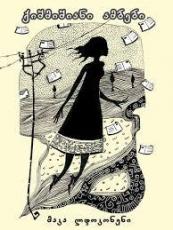RAISIN STORIES
‘Today it is hard to say whether a Finnish grandfather reading „The Knight in the Panther Skin“ in Georgian, or having Georgian ancestors on her maternal side is the reason, but the fact remains that Maka Ldokonen’s stories are distinguished, above all, by their extraordinary Georgian language. The most significant defect of modern writing is, in fact, its impoverished and over-simplified vocabulary: it seems to me to be made up of one intonation and, given this fact, it is cause for joy that Maka’s stories are marked by their very varied linguistic and stylistic searches. Here, so many layers of literary Georgian and of regional dialects are used, and the narrative language explores so many registers of the literary language, and in such a masterly way, that Ldokonen’s prose, in this respect gives one great aesthetic pleasure.’
Giorgi Lobjanidze, poet, literary critic, Radio Liberty
In case of using the information, please, indicate the source.
